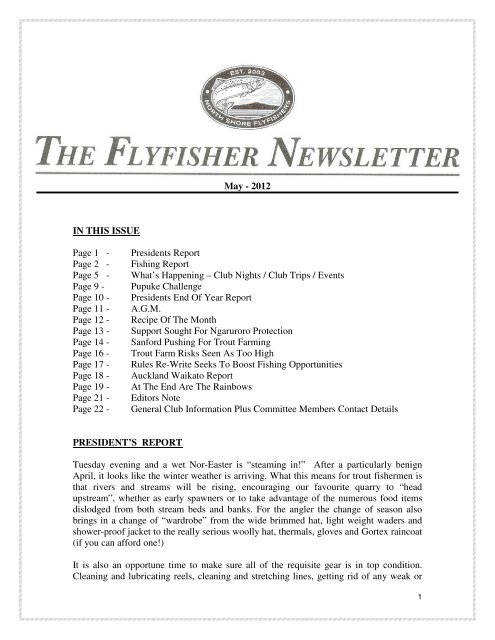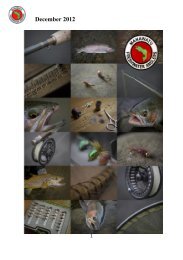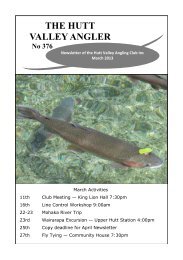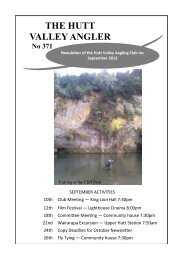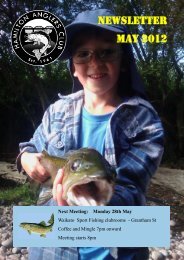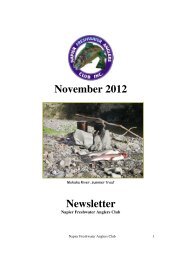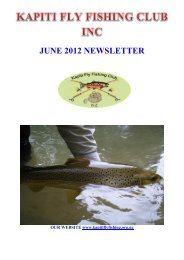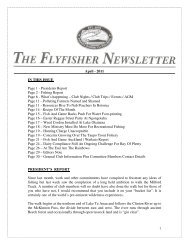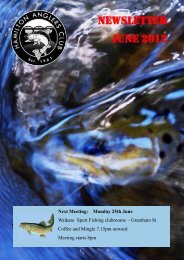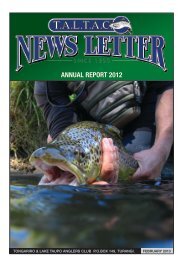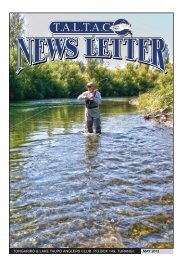May - Christchurch Fishing and Casting Club
May - Christchurch Fishing and Casting Club
May - Christchurch Fishing and Casting Club
You also want an ePaper? Increase the reach of your titles
YUMPU automatically turns print PDFs into web optimized ePapers that Google loves.
<strong>May</strong> - 2012<br />
IN THIS ISSUE<br />
Page 1 -<br />
Page 2 -<br />
Page 5 -<br />
Page 9 -<br />
Page 10 -<br />
Page 11 -<br />
Page 12 -<br />
Page 13 -<br />
Page 14 -<br />
Page 16 -<br />
Page 17 -<br />
Page 18 -<br />
Page 19 -<br />
Page 21 -<br />
Page 22 -<br />
Presidents Report<br />
<strong>Fishing</strong> Report<br />
What’s Happening – <strong>Club</strong> Nights / <strong>Club</strong> Trips / Events<br />
Pupuke Challenge<br />
Presidents End Of Year Report<br />
A.G.M.<br />
Recipe Of The Month<br />
Support Sought For Ngaruroro Protection<br />
Sanford Pushing For Trout Farming<br />
Trout Farm Risks Seen As Too High<br />
Rules Re-Write Seeks To Boost <strong>Fishing</strong> Opportunities<br />
Auckl<strong>and</strong> Waikato Report<br />
At The End Are The Rainbows<br />
Editors Note<br />
General <strong>Club</strong> Information Plus Committee Members Contact Details<br />
PRESIDENT’S REPORT<br />
Tuesday evening <strong>and</strong> a wet Nor-Easter is “steaming in!” After a particularly benign<br />
April, it looks like the winter weather is arriving. What this means for trout fishermen is<br />
that rivers <strong>and</strong> streams will be rising, encouraging our favourite quarry to “head<br />
upstream”, whether as early spawners or to take advantage of the numerous food items<br />
dislodged from both stream beds <strong>and</strong> banks. For the angler the change of season also<br />
brings in a change of “wardrobe” from the wide brimmed hat, light weight waders <strong>and</strong><br />
shower-proof jacket to the really serious woolly hat, thermals, gloves <strong>and</strong> Gortex raincoat<br />
(if you can afford one!)<br />
It is also an opportune time to make sure all of the requisite gear is in top condition.<br />
Cleaning <strong>and</strong> lubricating reels, cleaning <strong>and</strong> stretching lines, getting rid of any weak or<br />
1
usty flies <strong>and</strong> probably purchasing a few new reels of leader material to replace the ones<br />
that have lived in the bag or vest over the last summer (or two!) It’s cheap insurance to<br />
improve the odds of actually l<strong>and</strong>ing that winter trophy.<br />
My favourite destination at this time of the year (notwithst<strong>and</strong>ing my predilection to<br />
chase crayfish), is the edges of the Rotorua lakes. From now until the season closes on<br />
June 30 th , some beautiful fish can be caught along the beach fronts at Ruato <strong>and</strong><br />
Hinehopu on Lake Rotoiti, Lake Okataina <strong>and</strong> Oneroa Beach on Lake Rotoma. While<br />
wet weather, particularly at night, is pretty uncomfortable, it often produces the best fish<br />
so wrap up appropriately <strong>and</strong> go for it. It’s amazing how a solid take <strong>and</strong> a screaming reel<br />
can push the weather right to the back of your mind.<br />
A couple of weeks ago, four of us made one of our regular trips to Lake Otamangakau<br />
although with the season there closing on <strong>May</strong> 30 th , we probably wont be back until the<br />
new season. As is so often the case, the daytime fishing was quite hard <strong>and</strong> what fish<br />
were caught were generally small but true to form, the fishing after dark, was the usual<br />
“big hits!” A mixture of small dark flies, “Yoshi Buggers” <strong>and</strong> luminous flies did the<br />
“damage” <strong>and</strong> notwithst<strong>and</strong>ing the widely held belief that Brown Trout don’t take<br />
“glowy” flies, I caught two prime browns around 7 or 8 pounds on a luminous Scotch<br />
Poacher.<br />
Next Tuesday (<strong>May</strong> 15 th ) is our club AGM. It would be great to see as many of you as<br />
possible at the meeting <strong>and</strong> if any of you have family members, friends or acquaintances<br />
who might be interested in joining the club, they would be welcome as visitors. While<br />
unable to participate in the formalities of the actual AGM, they would still be able to<br />
meet club members <strong>and</strong> enjoy our speaker.<br />
Dave Symes - President<br />
FISHING REPORT<br />
Auckl<strong>and</strong> / Waikato<br />
Lake Pupuke has just been restocked with Trout <strong>and</strong> is well worth a visit.<br />
With all this rain hitting the Ohinemuri at present, fishing over the weekend could<br />
produce some good numbers of Trout. In the past I have found that my highest catch rates<br />
here were as the river was dropping down from a minor flood <strong>and</strong> still carrying plenty of<br />
colour. Flies that have worked there in coloured water are Copper Johns, gold bead Hare<br />
<strong>and</strong> Coppers <strong>and</strong> even big (size 8-10) Royal Wulfs.<br />
The Waikato hydro lakes seem to be fishing extremely well <strong>and</strong> giving up some very well<br />
conditioned Trout.<br />
The Waipa tributary system is holding high numbers of good sized fish but they have<br />
been very line shy. On our last visit we didn’t see any obvious Redds but we did see a<br />
2
number of fish paired up as well as a few pods of pre spawning Brownies so carrying a<br />
glo bug or two might be a useful idea.<br />
Rotorua<br />
With Okere Falls Arm <strong>and</strong> the Kaituna River being so clear it is easier to see spawning<br />
fish that are holding in small numbers both above <strong>and</strong> below the control gates. There are<br />
larger than expected numbers of rainbows up to the one <strong>and</strong> a half kilo mark still around<br />
but larger fish are turning up in ever increasing numbers. Most of the larger fish have<br />
been holding under the turbulent water directly below the gates, but with the gates wide<br />
open there isn’t any turbulence at the moment. Woolly bugger <strong>and</strong> ginger mick flies are<br />
working well during the day <strong>and</strong> black marabou are great after dark.<br />
Lake Rotoehu has fish coming into the liberation points, most seem to be around the one<br />
<strong>and</strong> a half to two kilo mark <strong>and</strong> all are fairly good condition. The water quality is not<br />
great so the use of a light coloured fly such as a grey ghost should produce results. As<br />
this lake has only dropped 100mm or so since summer there is little chance of wading too<br />
far along the lake edge. Remember also that this lake is used for duck hunting so early<br />
morning <strong>and</strong> late afternoon trolling or harling is best left until the hunting season finishes.<br />
I was pleasantly surprised to see a lot of fish, some on the very large size, actively<br />
feeding off the surface <strong>and</strong> over the weed bed at Ruato Bay over the weekend. Some<br />
were too far out to be able to cast to but there were others that were well within range of<br />
an average caster of the fly. <strong>Casting</strong> a line over the weed bed at either end of Ruato Bay<br />
after dark should bring results, especially once the moon has reduced in size. A heavy<br />
cloud cover will help also as will a reasonable amount of wind as fish have been very<br />
wary on the very still nights that we have had. The Dump through to the Pipe has been<br />
fairly quiet but a lot of rain hit the area over the past couple of days. This should have<br />
improved things no-end, especially for early morning fishing trips.<br />
Lake Rerewhakaaitu has fished well both from the shore <strong>and</strong> by boat, though the shore<br />
based angling is still restricted by the high water level. Both Homestead <strong>and</strong> School Arms<br />
have produced fish for flingers of the fly or spinner, especially on change of light, but<br />
those harling have struggled some days. Darker smelt patterns such as the ginger mick<br />
have caught well. Smelt are still in amongst the trees, drawing trout in close, though<br />
without a boat they are challenge to get at.<br />
Lake Okaro continues to provide great fishing, especially since the rain. This lake always<br />
provides surprises, especially in the size of the fish. On more than one occasion rainbows<br />
over three kilos have been caught from the shore.<br />
Taupo Region<br />
Well at long last we look to have a change in the weather. At the time of writing this<br />
report it is bucketing down <strong>and</strong> I expect that all of our local rivers will receive a good<br />
flush out. Up until this point they have been all low <strong>and</strong> clear but have fished very well. I<br />
have had very good reports of the fishing on the Hinemaiaia, Tauranga-Taupo <strong>and</strong><br />
3
Tongariro rivers. Numerous fresh fish have been caught using predominantly natural<br />
patterns of fly such as hare <strong>and</strong> copper, claret nymph, cadillac pheasant tail <strong>and</strong> the green<br />
caddis.<br />
With the rain we are getting at the moment expect another run of fish. There has been<br />
some good fishing at the river mouths indicating that there are reasonable numbers of fish<br />
ready to run with the weather change. A decent flush of water through the rivers won't do<br />
us any harm at all going into the winter.<br />
Out on the Great Lake the fishing continues to be very good. A lot of fish are still being<br />
caught jigging throughout the day. Target depth jigging is 25 metres. Nothing much has<br />
changed with regard fly patterns, the combination of ginger mick, grey ghost <strong>and</strong> olive<br />
wooly bugger has still been a good producer of fish. Harling for the first couple of hours<br />
of the day has been good. Best flies for harling have been the red body green orbit, ginger<br />
mick <strong>and</strong> jack spratt. Trolling has been OK through the day but better in the early<br />
morning. Target a depth of 40 metres. Best lures are spotty gold, hot orange <strong>and</strong> the black<br />
toby.<br />
Just a reminder to anglers wishing to fish Lakes Otamagakau <strong>and</strong> Kurutau this weekend,<br />
it is duck shooting season <strong>and</strong> there will be duck hunters shooting around the Lake so you<br />
will need to factor this into your consideration fishing these Lakes at this time of the year.<br />
Fishy Tales<br />
- If you do have a report, success story, or anecdote to share then just send it to<br />
iconp@ihug.co.nz .<br />
Happy <strong>Fishing</strong> <strong>and</strong> Tight Lines - Freddy Da Fish.<br />
WHY WE FISH<br />
Our tradition is that of the first man who sneaked away to the creek when the tribe did<br />
not really need fish.<br />
Roderick Haig-Brown<br />
4
Dave McLellan toasting his success. Photo courtesy of Roy Richardson.<br />
LAST CLUB NIGHT<br />
Last month we had a very social evening <strong>and</strong> enjoyed an excellent video. It was a very<br />
interesting night. Thank you Brendan for supplying the video.<br />
NEXT CLUB NIGHT – Tuesday 15 th <strong>May</strong> – 7.30pm<br />
This month we will have our AGM, starting at 7.30pm, followed by a talk from Paul<br />
Williams. Paul is an accomplished fly fisher <strong>and</strong> a Professor of Geology at Auckl<strong>and</strong><br />
University. His talk will be titled ‘Know Your Waters: Goings on in <strong>and</strong> around lakes’.<br />
This is sure to be an interesting night <strong>and</strong> we hope to see you all there.<br />
CLUB TRIPS 2012<br />
February – Ngongotaha River <strong>and</strong> Rotorua Lakes<br />
March – Lake Otamangakau<br />
<strong>May</strong> – 25 th 26 th 27 th <strong>May</strong> Ngongotaha River <strong>and</strong> Rotorua Lakes<br />
July - Tongariro <strong>and</strong> Tauranga Taupo<br />
5
October - Lakes Rotoaira <strong>and</strong> Otamangakau<br />
October – Lake Aniwhenua <strong>and</strong> surrounding Rivers, Phil Gates<br />
November – Intermediate Tuition weekend<br />
December – Tuition weekend on Ohinemuri River<br />
The NSF committee arrange various <strong>Club</strong> Trips over the year to different parts of the<br />
country. If you would like to be involved, or have an idea for a trip please let one of your<br />
committee know.<br />
D.V.D. LIBRARY<br />
The following DVD’s are available from the <strong>Club</strong> Library. If you would like to borrow<br />
one please contact Dave Symes at the next <strong>Club</strong> Night or via email, dssymes@xtra.co.nz<br />
ESSENTIAL SKILLS With OLIVER EDWARDS<br />
ESSENTIAL PATTERNS With OLIVER EDWARDS<br />
STILLWATER PRESENTATIONS With DENNY RICHARDS<br />
ADVANCE FLYCASTING DOUG SWISHER<br />
CHRIS OGBORNE’S SINKING LINE TECHNIQUES<br />
NEW WAYS OF FISHING THE CADDIS FLY<br />
NEW WAYS OF FISHING THE MAYFLY<br />
HOW TO SUCCEED ON SMALL STILLWATERS PART ONE<br />
HOW TO SUCCEED ON SMALL STILLWATERS PART TWO<br />
HOW TO SUCCEED ON RESERVOIRS PART ONE<br />
HOW TO SUCCEED ON RESERVOIRS PART TWO<br />
NEW ZEALAND FLYTYING With JOHN GIACON<br />
THE EDUCATED TROUT<br />
WEE WETS AND DOWNSTREAM DRYS With DAVE McLELLAN<br />
CLUB DVD'S<br />
If you have borrowed DVD's <strong>and</strong> have finished viewing them, please bring them back to<br />
the next meeting.<br />
SUBS<br />
In an effort to get <strong>Club</strong> Membership Subscriptions in quicker we are instigating two new<br />
options.<br />
1) Subs can now be paid by direct credit to the <strong>Club</strong>s Bank Account via the following A/c<br />
number. If you do choose to use this facility please remember to enter your full name or<br />
your Membership Number (shown on your Membership Card) along with your payment<br />
details so John knows where the money came from!<br />
North Shore Flyfishers Incorporated<br />
ASB A/c #: 12-3209-0190179-00<br />
6
MAY ROTORUA AND NGONGOTAHA CLUB TRIP<br />
This year’s MAY <strong>Club</strong> Trip to fish the Ngongotaha River <strong>and</strong> the Rotorua region is<br />
taking place on the weekend of Friday 25 th , Saturday 26 th <strong>and</strong> Sunday 27 th of <strong>May</strong>. We<br />
will again be staying at the Paradise Valley Lodge, which backs onto the river. Costs will<br />
be $75.00 each, which will cover 2 nights accommodation in the lodge <strong>and</strong> a BBQ on<br />
Saturday evening.<br />
During <strong>May</strong> this river can produce some excellent fishing for fresh run Rainbows <strong>and</strong><br />
Browns, but be warned, these powerful fish may take your fly willingly enough but they<br />
are even better at keeping it or giving it back to you, usually bent.<br />
Also, the river mouths <strong>and</strong> lake edges in the area are renowned for the quality <strong>and</strong> size of<br />
their fish. (All reports are saying that with the arrival of the Smelt back into Lake Rotorua<br />
the size <strong>and</strong> condition of the Rainbows has had a dramatic improvement from last year).<br />
So if you prefer Lake fishing or the rivers are all in flood then there are still plenty of fly<br />
fishing options available for your enjoyment.<br />
Organiser for this trip is Duncan Frew, available on 021 648 956 or iconp@ihug.co.nz .<br />
Rainbow Central. Lake Pupuke receiving another 1000 Rainbows <strong>and</strong> 100 Browns last<br />
month, courtesy of Fish <strong>and</strong> Game Auckl<strong>and</strong> / Waikato.<br />
7
NEW NEWS ON THE FLY TYING FRONT!<br />
Phil Gates has added an excellent article on using CDC feathers as hackles or legs onto<br />
your nymphs. It is well worth the read! Thank you to Phil for all his great work on the<br />
website, (check it out), - www.nsff.org.nz .<br />
JOKE OF THE MONTH<br />
Waiting in Doncaster , to catch speeders, a Police Officer sees a car puttering along at 22<br />
MPH. Says he to himself: "This driver is just as dangerous as a speeder!" So he turns on<br />
his lights <strong>and</strong> pulls the driver over.<br />
Approaching the car, he notices that there are five old ladies, <strong>and</strong> all but the driver are<br />
wide eyed <strong>and</strong> white as ghosts. The driver, obviously confused, says to him "Officer, I<br />
don't underst<strong>and</strong>, I was doing exactly the speed limit! What seems to be the problem"<br />
"Ma'am," the officer replies, "you weren't speeding, but you should know that driving<br />
slower than the speed limit can also be a danger to other drivers."<br />
"Slower than the speed limit No sir, I was doing the speed limit exactly...Twenty-two<br />
miles an hour!" ....the old woman says a bit proudly.<br />
The Police officer, trying to contain a chuckle explains to her that A22 is the road<br />
number, not the speed limit. A bit embarrassed, the woman grins <strong>and</strong> thanks the officer<br />
for pointing out her error.<br />
"But before I let you go, Ma'am, I have to ask...Is everyone in this car OK These other<br />
women seem awfully shaken, <strong>and</strong> they haven't made a sound this whole time," the officer<br />
asks.<br />
"Oh, they'll be all right in a minute officer. We've just come off the A120."<br />
QUOTABLE QUOTES<br />
Consider the renowned Scottish gillie who was asked what was the single most important<br />
skill for a a career fishing guide. After scratching his beard in deep thought he replied,<br />
'I'd have to say it'd be the ability to yawn with your mouth shut.'<br />
Quoted in 'The Trout Diaries'<br />
8
FISHING BUDDIES SOUGHT<br />
This is a br<strong>and</strong> new idea for the Newsletter, prompted by Member suggestion, so<br />
hopefully it will grow into something we can all utilize from time to time. The intention<br />
is to display a list of names of <strong>Club</strong> Members that are keen on finding a ‘buddy’ to go<br />
fishing with, either on a regular basis or just for a day. In essence it’s a fly-fishing dating<br />
service. It will look something like this…<br />
Name Availability Contact Details<br />
Ron Blair Anytime Has 12ft Tinny ron.blair@xtra.co.nz<br />
Barrie Barnes Anytime barrieb@arkon.co.nz<br />
Always keen on exploring<br />
‘new water’, especially close to<br />
Auckl<strong>and</strong> waters.<br />
Charles Wilma Anytime but would prefer home 09 427 4521<br />
Mid-week mobile 021 067 3253<br />
Les Rose Retired <strong>and</strong> is happy to take another home 09 4183634<br />
person fishing during the week.<br />
Has a small 2 person boat.<br />
Daryl Sinclair Anytime he can get a pass. foursinclairs@xtra.co.nz<br />
So, if you are keen to find someone to share the cost <strong>and</strong> the fun of a fishing expedition<br />
with, then send in your details <strong>and</strong> we will get it all started.<br />
Send details to iconp@ihug.co.nz<br />
LAKE PUPUKE CHALLENGE 2012<br />
The sixth Lake Pupuke Challenge, an annual fishing competition on Auckl<strong>and</strong>’s North<br />
Shore took place on Sunday, 6 <strong>May</strong>.<br />
Although conditions were ideal, there were probably fewer anglers than recent years,<br />
particularly in the junior ranks.<br />
Ten rainbow trout were weighed in. Nine of these had been released earlier in the month.<br />
The heaviest fish, caught by David Yang, was 800 g <strong>and</strong> would have been released last<br />
year.<br />
Only one other species, a small perch, was presented.<br />
Sylvan Park is a busy place in the weekends <strong>and</strong> the weigh-in <strong>and</strong> prize giving always<br />
attracts quite a few byst<strong>and</strong>ers in addition to the anglers <strong>and</strong> family members, thus<br />
spreading the word about Pupuke as a local fishing destination.<br />
9
NSFF <strong>and</strong> Trout Unlimited acknowledge the on-going support of the event by Hunts<br />
Sports Store.<br />
Dennis Smith<br />
<strong>Club</strong> President Dave Symes with first prize winner David Yang <strong>and</strong> 2 nd prize winner<br />
Portia Alex<strong>and</strong>er. Photos courtesy of Dennis Smith.<br />
PRESIDENT’S END OF YEAR REPORT 2012<br />
Yet another year has come <strong>and</strong> gone in the life of North Shore Flyfishers <strong>Club</strong> <strong>and</strong><br />
following the AGM, we will be entering the 10 th year after our 2003 establishment. As<br />
the old saying goes, ”time flies when you’re having fun!”<br />
In contrast to many other clubs <strong>and</strong> societies which suffer from the problem of declining<br />
numbers, our club enjoys a pretty steady level of membership with new arrivals roughly<br />
balancing leavers. There are always a multitude of reasons behind these patterns but in<br />
our case, I think the growing level of interest in fly fishing as a recreational pursuit (both<br />
fresh <strong>and</strong> saltwater), the affordable membership cost <strong>and</strong> the excellent central North<br />
Shore location for meetings are very positive factors under pinning our success. With<br />
regard to the last point, I would like to thank Milford Cruising <strong>Club</strong> <strong>and</strong> their staff for<br />
their ongoing support.<br />
As is usual in reports of this type, I would also like to thank my fellow committee<br />
members for the effort <strong>and</strong> work that they put in on behalf of all members. Most of us are<br />
prepared to offer our services for a further year with one or two st<strong>and</strong>ing down. I will ask<br />
for nominations from the floor on AGM night so please give some thought to possibly<br />
joining the committee. It is not an onerous task <strong>and</strong> the injection of “new blood” <strong>and</strong><br />
ideas is always welcome.<br />
<strong>Club</strong> trips have, on the whole, been well patronised during the year although it is<br />
noticeable that in many cases, it is the same members attending. That is no bad thing but<br />
it would be great for some others in the club to join in because there is much to be<br />
10
learned <strong>and</strong> enjoyed in the company of “like-minded” individuals sharing knowledge <strong>and</strong><br />
skill in our great outdoors.<br />
Once again, John Cuthbertson, our very capable treasurer, has managed club finances<br />
impeccably. John will present his report at the AGM <strong>and</strong> answer any questions you may<br />
have.<br />
Finally, I would ask all members to give some thought to increasing our club membership<br />
by “spreading the word” through friends <strong>and</strong> associates in the “fishing world.” There are<br />
hundreds, if not thous<strong>and</strong>s of anglers on the North Shore who chase snapper, kahawai <strong>and</strong><br />
kingfish by traditional methods but the rising levels of interest <strong>and</strong> participation in<br />
saltwater fly fishing, combined with the knowledge <strong>and</strong> experience within the club, could<br />
be an attractive drawcard.<br />
Thank you all for your participation <strong>and</strong> support over the past year <strong>and</strong> I hope to see you<br />
all at the club AGM on Tuesday 15 th of <strong>May</strong>.<br />
Dave Symes – President<br />
2012 ANNUAL GENERAL MEETING<br />
Notice is hereby given of the Annual General Meeting of The North Shore Flyfishers<br />
Incorporated to be held at the Milford Cruising <strong>Club</strong> 24 Craig Road Milford on the 15 th<br />
<strong>May</strong> 2012 commencing at 7.30pm.<br />
Copies of the Audited accounts will be available at the Committee table prior to the<br />
AGM.<br />
AGENDA FOR THE AGM AS FOLLOWS:<br />
1. Welcome<br />
2. Apologies<br />
3. President’s report<br />
4. Treasurer’s report <strong>and</strong> financial situation<br />
5. Set subscription rate for the year (already done)<br />
6. Election of officers <strong>and</strong> committee<br />
PRESIDENT<br />
SECRETARY<br />
TREASURER<br />
CLUB CAPTAIN<br />
COMMITTEE (5 people) required<br />
7. Notice of motions (See note below)<br />
8. General business<br />
9. AGM CLOSE<br />
NOTE: Any member wishing to place a notice of motion to be raised at the AGM must<br />
do so in writing <strong>and</strong> be received by the executive committee no later than 8 th <strong>May</strong> 2012<br />
11
RECIPE OF THE MONTH<br />
Thai Steamed Trout – Recipe courtesy of Fish <strong>and</strong> Game NZ<br />
Because trout is so mild, it's very versatile - equally at home pan-fried in white wine <strong>and</strong><br />
garlic or steamed with fresh Thai flavors as it is in this recipe.<br />
Ingredients:<br />
<br />
<br />
<br />
<br />
<br />
<br />
<br />
<br />
<br />
1 x 250 gram trout, gutted <strong>and</strong> washed<br />
1 Tbsp of cilantro, finely chopped<br />
3 garlic cloves, crushed<br />
Juice from 1 lime 1 bird chili, finely chopped<br />
1.5 Tbsp of fish sauce<br />
3/4 tsp of sugar<br />
1 Tbsp of water<br />
Steamed rice<br />
Chinese broccoli<br />
Preparation:<br />
<br />
<br />
<br />
<br />
<br />
<br />
<br />
<br />
<br />
Turn the oven grill on<br />
Wash the trout <strong>and</strong> pat it dry with a paper towel<br />
In a small bowl mix together the crushed garlic, lime juice, cilantro, chili <strong>and</strong><br />
sugar. Stir well. Add 1 Tbsp of water <strong>and</strong> stir again<br />
Place the trout in a large piece of foil. Crimp the foil into the shape of a boat <strong>and</strong><br />
twist the ends closed<br />
Pour the sauce over the fish <strong>and</strong> a little inside it<br />
Crimp the foil tightly so that no steam or liquid can escape<br />
Place the fish in a large baking dish <strong>and</strong> then bake for 20-25 minutes<br />
Remove fish from the oven <strong>and</strong> carefully open the foil<br />
Serve fish in foil or filet it <strong>and</strong> serve it with the sauce poured on top with steamed<br />
rice <strong>and</strong> Chinese broccoli<br />
12
SUPPORT SOUGHT FOR NGARURORO PROTECTION<br />
Hawkes Bay Today – 17/04/2012<br />
Fish <strong>and</strong> Game New Zeal<strong>and</strong> proposes to apply for a Water Conservation Order over the<br />
Ngaruroro River <strong>and</strong> its tributaries that could prohibit or restrict new water <strong>and</strong> discharge<br />
permits being issued.<br />
Fish <strong>and</strong> Game Hawke's Bay regional manager Peter McIntosh has called a hui with all<br />
marae, hapu, claimant groups <strong>and</strong> iwi connected to the river in the hope people will<br />
consider a joint application for the order to the Minister of the Environment.<br />
Mr McIntosh's letter, outlining the hui at Kohupatiki Marae in Clive on April 20, said the<br />
Ngaruroro River system deserved greater protection from "adverse development" such as<br />
dams for hydro-electric power generation, declining water flows, water quality <strong>and</strong><br />
drainage wetl<strong>and</strong>s.<br />
A Water Conservation Order would "protect the outst<strong>and</strong>ing trout fishery, wild <strong>and</strong><br />
scenic nature", <strong>and</strong> associated water recreation for the section of river <strong>and</strong> tributaries<br />
upstream of Whanawhana, northwest of Hastings city.<br />
"We are aware that there are also some important cultural <strong>and</strong> historic values in this part<br />
of the catchment," Mr McIntosh said.<br />
Downstream of Whanawhana the river was not so remote but mahinga kai, spiritual,<br />
cultural, birdlife <strong>and</strong> other fisheries such as eels, whitebait <strong>and</strong> flounder were associated<br />
with the river.<br />
Mr McIntosh said there was a chance for Fish <strong>and</strong> Game, along with iwi, to consider<br />
preparing a joint application for a Water Conservation Order over "a greater length of the<br />
waterway" than what Fish <strong>and</strong> Game "could justify itself".<br />
"This could include the river from its source downstream to the mouth, some wetl<strong>and</strong>s<br />
<strong>and</strong> tributaries," he said.<br />
To be successful, the application for a Water Conservation Order had to meet<br />
requirements similar to those that determined national park status. The Ngaruroro River<br />
begins in the Kaimanawa, Kaweka <strong>and</strong> Ruahine Ranges.<br />
It flows out to the ocean between Clive <strong>and</strong> Awatoto.<br />
The hui at Kohupatiki Marae will be used for feedback to ask if iwi associated with the<br />
river, its tributaries, streams <strong>and</strong> wetl<strong>and</strong>s, support the Fish <strong>and</strong> Game proposal for a<br />
Water Conservation Order.<br />
A total of 16 conservation orders cover water bodies that have outst<strong>and</strong>ing amenity or<br />
values in New Zeal<strong>and</strong>.<br />
13
SANFORD PUSHING FOR TROUT FARMING<br />
Penny Wardle – Marlborough Express – 19/04/2012<br />
Fisheries company Sanford is lobbying the Government to lift its ban on farming trout in<br />
the sea so they can grow the fish species in places including the Marlborough Sounds.<br />
Sanford managing director Eric Barratt yesterday told the Marlborough Express that the<br />
Sounds would be more suited to cage-farming of trout than salmon because they could<br />
tolerate higher water temperatures.<br />
Unlike New Zeal<strong>and</strong> King Salmon, Sanford would not seek to farm fish in places where<br />
the Marlborough District Council had prohibited aquaculture, Mr. Barratt said. Instead,<br />
the company would aim to convert some of its existing 300 mussel farms to trout.<br />
"In our mind, sea-farming of trout is one of the best opportunities to exp<strong>and</strong> aquaculture<br />
<strong>and</strong> would be economically viable," he said.<br />
Hundreds of thous<strong>and</strong>s of tones of trout were grown in countries including Chile <strong>and</strong><br />
Norway <strong>and</strong> traded on world markets. Other coastal sites in New Zeal<strong>and</strong> could also be<br />
suited to sea-farming of trout, Mr. Barratt said.<br />
The 1987 Conservation Act used to prohibit the farming of salmon <strong>and</strong> trout, he said.<br />
About 20 years ago, government lifted the ban to allow salmon-farming. Recreational<br />
fishers' fears that this would cause problems including trout disease <strong>and</strong> mass escapes had<br />
proved unfounded.<br />
Sanford farms salmon at Stewart Isl<strong>and</strong> but grows only shellfish in the Marlborough<br />
Sounds.<br />
Mr. Barratt <strong>and</strong> the Sanford board were in Havelock yesterday to tour the company's<br />
mussel-processing factory, visit Marlborough Sounds mussel farms <strong>and</strong> meet people from<br />
supporting businesses.<br />
Sanford aquaculture manager Ted Culley said the company grew 1000 hectares of<br />
mussels on 300 farms in the Marlborough Sounds; about one third of the total musselfarming<br />
area. In recent years the company had invested about $130 million in<br />
Marlborough including mechanisation of the Havelock plant which was completed in<br />
April last year.<br />
Sanford bought Sealord mussel farms two years ago <strong>and</strong> in December 2010 acquired<br />
Pacifica Seafoods including Marlborough Mussel farms, boats <strong>and</strong> equipment, Mr.<br />
Culley said.<br />
Mechanisation of the Havelock factory had meant being able to process extra mussels<br />
from the exp<strong>and</strong>ed operation without increasing staff, which stood at 230 people working<br />
14
in two shifts, he said. Seventy people worked on company farms <strong>and</strong> in harvesting <strong>and</strong><br />
seeding.<br />
Mr. Barratt said the board's visit was a chance to talk about whether the company should<br />
make a submission on New Zeal<strong>and</strong> King Salmon's application to develop nine new<br />
salmon farms in the Marlborough Sounds.<br />
A decision was not reached but consensus was that coastal marine zones where the<br />
Marlborough District Council had prohibited aquaculture should be respected. However,<br />
board members were disturbed at the "inaccurate science" being put forward by<br />
opponents, Mr. Barratt said.<br />
Submitting would be a good opportunity to inform the Environmental Protection<br />
Authority about Sanford business operations <strong>and</strong> philosophy, he said.<br />
The Marlborough council has floated charging aquaculture businesses a coastal<br />
occupancy fee to cover water quality monitoring costs. Mr. Barrett said Sanford would<br />
not object to this charge if it paid for monitoring but would oppose any attempt to make<br />
companies pay because they were making money from coastal space.<br />
Trout farming is banned in New Zeal<strong>and</strong> because of dangers to the recreational fishing<br />
<strong>and</strong> tourism industries from farmed trout. There are concerns about diseases. There is<br />
also the issue of placing a value on trout, with the wild fish vulnerable to poaching. It is<br />
illegal to sell trout in New Zeal<strong>and</strong>.<br />
Jimmy Teen <strong>and</strong> an 8pd Brown in absolutely pristine South Isl<strong>and</strong> back country.<br />
Photo courtesy of A.N. Other.<br />
15
TROUT FARM RISKS SEEN AS TOO HIGH<br />
Penny Wardle – Marlborough Express – 26/04/2012<br />
Marlborough angler Tony Orman battled trout farming in the 1970s <strong>and</strong> says he is<br />
prepared to do so again.<br />
The Marlborough Express last week reported that New Zeal<strong>and</strong>'s largest publicly owned<br />
fishing company, Sanford, was lobbying the Government to lift its ban on trout farming<br />
so it could grow the species in places including the Marlborough Sounds.<br />
Mr. Orman, of the Marlborough Recreational Fishers Association, said farming trout<br />
could damage New Zeal<strong>and</strong>'s world famous trout fishery, which was a big earner of<br />
tourism dollars <strong>and</strong> a recreation asset.<br />
"Estimates put the economic generation of trout fishing at $70 million a year," he said.<br />
Allowing the sale of trout flesh would encourage poaching <strong>and</strong> sale on black markets,<br />
impossible to control in New Zeal<strong>and</strong>'s multitude of wild rivers, Mr. Orman said.<br />
Overseas, whirling disease <strong>and</strong> ulcerative dermal necrosis were among illnesses which<br />
flared up in trout farms then spread to wild trout <strong>and</strong> salmon, he said.<br />
National Party president Peter Goodfellow was a Sanford director <strong>and</strong> major shareholder,<br />
said Mr. Orman, who believed for National to promote a law change could involve a<br />
conflict of interest.<br />
Mr. Goodfellow said his family always openly disclosed that they were Sanford<br />
shareholders. He did not know the company was actively lobbying the Government to<br />
free up salmon-farming, but this was the domain of managers, not directors, he said.<br />
However, Mr. Goodfellow supported discussion about whether commercial farming of<br />
trout might be compatible with safeguarding recreational fishing.<br />
Nelson Marlborough Fish & Game manager Neil Deans, of Nelson, said if Sanford was<br />
serious about trout farming, it would need to approach his organisation as the sole source<br />
of stock. This was unless they planned to import trout, which was unlikely to be allowed.<br />
"They would have to convince the anglers of New Zeal<strong>and</strong> that this would be a good<br />
thing but ... trout farming has always been our risk <strong>and</strong> someone else's gain."<br />
Mr. Deans shared Mr. Orman's concern that allowing the sale of trout could promote<br />
poaching. Unlike salmon, trout were edible when they spawned so the breeding fish<br />
could be scooped up in large numbers then sold, he said.<br />
Opening up commercial hatcheries around New Zeal<strong>and</strong> risked the spread of diseases like<br />
whirling disease, found in Canterbury but not in the North Isl<strong>and</strong>, Mr. Deans said. Farm<br />
escapees could corrupt the wild gene pool, he said.<br />
16
Trout were a freshwater species with a very different biology to salmon <strong>and</strong> less highly<br />
valued for aquaculture. Any government must weigh up disease, genetic, poaching <strong>and</strong><br />
also biosecurity risks like the spread of didymo against minimal gain, he said.<br />
New Zeal<strong>and</strong> Federation of Freshwater Anglers president Ken Sims, of Palmerston<br />
North, questioned whether government would encourage the Sanford proposal to replace<br />
mussels, which filtered the water they lived in, with trout, which would heavily pollute<br />
their environment.<br />
A MAF spokesperson said trout farming is prohibited under the Conservation Act <strong>and</strong><br />
Fisheries Act. In the early 1970s salmon <strong>and</strong> trout farming where both considered, but the<br />
government decided to only allow salmon farming.<br />
Clean Water = Big Trout - Big Trout = Big Fun.<br />
RULES RE-WRITE SEEKS TO BOOST FISHING OPPORTUNITIES<br />
Press Release – Eastern Fish And Game – 2/05/2012<br />
Fish & Game says a proposed re-write of some fishing rules will simplify them – <strong>and</strong><br />
create lots more opportunities for anglers – especially in summer.<br />
17
The Eastern Region Fish <strong>and</strong> Game Council is reviewing the rules that apply to fishing<br />
for trout in its waters – including the Rotorua Lakes, Tauranga, Waikaremoana <strong>and</strong> East<br />
Coast. The annual review process allows anglers to give their feedback on the regulations<br />
in the Angler’s Notice.<br />
Fish & Game Officer Matt Osborne says “this year, we’ve come up with some suggested<br />
changes in response to comments from anglers. Changes have been raised to simplify the<br />
current rules which have been criticised as unnecessarily complex.<br />
“What we propose is good news for veteran anglers <strong>and</strong> novices alike: the bottom line is<br />
greater opportunities for anglers – <strong>and</strong> now the Fish & Game Council is asking anglers to<br />
consider the suggestions, <strong>and</strong> write in with their feedback.”<br />
The regulations that apply to the winter shoreline fisheries on Lakes Tarawera, Rotoiti<br />
<strong>and</strong> Okataina have been identified as particularly complicated – because of the rules on<br />
fishing methods permitted in particular areas at certain times.<br />
“The Council proposal is that ‘fly fishing only’ periods for all the winter shoreline sites<br />
on these lakes would only come into effect from April 1st. This would mean far more<br />
opportunity for shoreline spin-fishing anglers over summer, but less for these spin fishers<br />
during the winter when they’re not normally too active in any case,” Mr. Osborne says.<br />
Another proposed change is to open all waters in the region at the beginning of October,<br />
providing anglers with more fishable waters earlier. The Council’s suggesting that all<br />
fishing waters open at the traditional 1 October season start after the winter, rather than<br />
some remaining closed till December. This will open up angling opportunities in areas<br />
such as the upper Ngongotaha, Waiteti <strong>and</strong> Utuhina streams (Rotorua), <strong>and</strong> the Mokau<br />
<strong>and</strong> Hopuruahine Streams at Waikaremoana (East Coast).<br />
The proposals for the 2012-13 season, if adopted, would come into effect on October 1st<br />
2012. Anglers are invited to view the proposals in detail on the Eastern Fish & Game<br />
website (eastern.fish<strong>and</strong>game.org.nz), or by contacting the local Eastern Region office.<br />
Anyone who wants to make a submission is urged to send them to Eastern Region Fish &<br />
Game by the end of <strong>May</strong> so the Fish & Game Council can consider them at their June<br />
Council meeting.<br />
AUCKLAND / WAIKATO REPORT<br />
Reel Life Magazine – Fish And Game NZ<br />
Hydo Lakes Turn It On.<br />
Throughout April the trout fishing has been superb with the rivers <strong>and</strong> hydro lakes fishing<br />
well. So far it has certainly been an exceptional autumn.<br />
18
Both Lakes Arapuni <strong>and</strong> Karapiro continue to produce high catch rates of large fish. The<br />
cool summer <strong>and</strong> high flows have produced excellent growth rates, <strong>and</strong> we are getting a<br />
lot of positive feedback from anglers. It would be at least 10 years since the hydro lakes<br />
fished this well.<br />
The small stream fishing continues to be outst<strong>and</strong>ing, partly because it was such a wet<br />
summer that we are still seeing good flows – despite the recent long period of dry<br />
weather. Streams along the Kaimai Ranges <strong>and</strong> the headwaters of the Waipa are holding<br />
large numbers of trout, including big browns that have recently moved in from the lower<br />
reaches.<br />
Further south, it can be difficult to fish the gorge sections of the Whakapapa <strong>and</strong> upper<br />
Whanganui due to the low angle of the sun shading much of the river <strong>and</strong> making it hard<br />
to spot fish or even to read the water. Over summer we’ve received mixed reports from<br />
both rivers. <strong>Fishing</strong> success appears to vary considerably day-by-day, <strong>and</strong> with the<br />
expertise of the angler.<br />
AT THE END ARE THE RAINBOWS<br />
Hugh Creasy<br />
There’s a fold in the hills, a twist of rock <strong>and</strong> clay where grass grows greener <strong>and</strong><br />
griselina grows untouched by grazing animals. And at the foot of an old hoheria,<br />
bedraggled in the autumn, with half its leaves gone, there is a bog where sedges push<br />
aside the grass <strong>and</strong> a trickle of brown water falls to a narrow valley, a gorge. It is the<br />
beginning of a river – its source.<br />
A few venturesome sheep have left their hoofmarks in the bog, but for the most part the<br />
steepness of the surrounding countryside keeps larger animals at bay. This is the grazing<br />
ground of hares, the habitat of skinks <strong>and</strong> geckos, sunbathing on the boulders. The<br />
mayflies <strong>and</strong> caddis rise from the gorge to rest on the rock faces <strong>and</strong> become sustenance<br />
for predators.<br />
There are soldier flies <strong>and</strong> hairy-headed moth midges where a tangle of fallen tree trunks<br />
has blocked the gorge. The decaying organic matter feeds them for all the years it takes<br />
trees to disintegrate <strong>and</strong> disappear. The water here seeps rather than flows, <strong>and</strong> where the<br />
gorge ends <strong>and</strong> the stream becomes defined there are patches of gorse <strong>and</strong> broom where<br />
mallards have molted <strong>and</strong> left their feathers strewn. In the stream, where the first pool is<br />
shaded, a giant kokopu hovers in the mud, its presence revealed by a waving dorsal fin.<br />
At the foot of the pool, smaller galaxids keep station, each with an invisible territory, a<br />
living space to graze <strong>and</strong> hunt.<br />
Below the pool the corpse of a ewe, dead during lambing in the spring, is now a hollow<br />
shell of bedraggled leather <strong>and</strong> wool, home to dronefly maggots, ready to pupate. The<br />
corpse has been visited by eels <strong>and</strong> all soft tissue has long gone but the carcass has<br />
released a rich diet to the stream’s wildlife.<br />
19
A little further<br />
downstream a tiny riffle<br />
flows into a pool where<br />
the water is near still.<br />
But the banks of the<br />
pool are damp, even in<br />
midsummer, <strong>and</strong> a<br />
swamp feeds acidic<br />
seepage to the flow.<br />
This is the upstream<br />
limit of habitat suited to<br />
trout, <strong>and</strong> one swims the<br />
pool’s edges, nosing<br />
patches of vegetation<br />
drooping in the water. It<br />
is not a big fish, but it<br />
has the pool to itself,<br />
living on a meager diet of midge larvae, water boatmen <strong>and</strong> backswimmers <strong>and</strong> whatever<br />
terrestrial insects drop to the water. Hoppers, moths <strong>and</strong> beetles fall from the forest trees,<br />
<strong>and</strong> now that autumn is here, frost-bitten cicadas, fat with protein, fall to the pool’s<br />
surface every night. The little fish grows quite fat.<br />
It is facing a great trial, perhaps the greatest of its life, that if it lives will become an<br />
annual adventure. The trout is not yet old enough to breed, its sex organs still<br />
undeveloped, though if it had had a better diet earlier in the summer it might have<br />
matured earlier.<br />
But as the autumn flow increases in the stream, the riffle at the head of the pool becomes<br />
a tempting place for spawning fish, <strong>and</strong> the little trout will soon have company.<br />
Last autumn the pool was crowded with spawning fish, hens laden with eggs, splashed<br />
into the riffle, bent sideways as they shifted silt from the stones, followed by jacks,<br />
bellies swollen with milt. They made redds <strong>and</strong> filled them with eggs, only for the earliest<br />
of them to be dislodged by latecomers intent on a similar purpose. It made nature seem<br />
wasteful. But following the spawning fish came juvenile trout, feasting on the excess.<br />
Dislodged eggs floated through the pool <strong>and</strong> down the riffles <strong>and</strong> runs, to be snapped up<br />
by younger trout <strong>and</strong> bullies, torrent fish <strong>and</strong> b<strong>and</strong>ed kokopu. Even mayfly larvae <strong>and</strong><br />
caddis joined the feast of protein dislodged in the breeding frenzy. And in a boggy hollow<br />
at the foot of the pool, a family of koura fed greedily on the eggs that came their way.<br />
The little trout has had the pool to itself all summer. It too was once a fertilised egg in the<br />
upstream riffle, <strong>and</strong> was left alone when its companions sped downstream last spring in<br />
search of richer feeding grounds. They will be back, heavy-jawed jacks <strong>and</strong> impatient<br />
hens, fighting for the best gravel <strong>and</strong> the jacks will battle to fertilise eggs. Without a<br />
mating imperative the little trout may well keep out of the battle ground, leaving larger<br />
fish to battle it out. The little trout may do well, <strong>and</strong> grow fatter on the excess of nature,<br />
20
ut if the territorial imperative proves too strong it may be involved in a fatal<br />
confrontation.<br />
At the moment it is a happy little fish, at home in its private pool. Downstream the<br />
hormones are raging <strong>and</strong> the storm will find it way upstream.<br />
What fate awaits this joyful scene<br />
EDITOR’S NOTE<br />
Fish <strong>and</strong> Game Auckl<strong>and</strong> / Waikato have released another 1100 Trout into Lake Pupuke<br />
so if you feel like a lazy flick before a <strong>Club</strong> Meeting or after work why not give it a go.<br />
From past experience I have found a Lumo Silicon Smelt to work quite well when fished<br />
on a floating line <strong>and</strong> over the shallow weed banks. Why it works when there are no<br />
smelt in the Lake I have no idea, but it does.<br />
FISHING FUNNIES<br />
21
(Opinions expressed in this Newsletter are those of the individual contributors <strong>and</strong> not neccessarillary those of North Shore Flyfishers Incorporated)<br />
MEMBERS FEEDBACK<br />
We, your committee, are always trying to give you what you want.<br />
But are we<br />
In order for us to do our job properly we need to have your feedback, positive or<br />
negative. For example, have you been on a club fishing trip Did you enjoy yourself<br />
What would you change, if anything <strong>Club</strong> nights – what would you like to see more of<br />
Less of In short, talk to us.<br />
The contact details of all your committee members are listed at the end of every<br />
newsletter. So if you have something on your mind let us know.<br />
Thank you - Your committee<br />
NSFF CLUB MERCHANDISE<br />
Cap – $15.00 Inclusive of GST<br />
Green or Beige, one size fits all, with embroidered badge.<br />
Embroidered Cloth Badge - $7.50 Inclusive of GST<br />
Brushed Brass Metal Pin Badge - $12.50 Inclusive of GST<br />
If anyone is interested in purchasing these products please either place an order at <strong>Club</strong><br />
Nights or at Hunts Sports.<br />
Meetings held the 3 rd Tuesday of each month at 7.30pm:<br />
Milford Cruising <strong>Club</strong>, 24 Craig Road, Milford, North Shore City<br />
NORTH SHORE FLYFISHERS EXECUTIVE<br />
<strong>Club</strong> Patron - Ian Hunt<br />
President - Dave Symes 486-6257 Takapuna dssymes@xtra.co.nz<br />
Secretary - Roy Richardson 415-8950 Coatesville roy@location.co.nz<br />
Treasurer - John Cuthbertson 413-6993 Greenhithe john.cuthbertson@nz.pwc.com<br />
Magazine - Duncan Frew 021 648 956 Torbay iconp@ihug.co.nz<br />
Committee - Phil Gates 480-2334 Northcote phil@mitgat.com<br />
Members Brendan James 021 595 305 Mairangi Bay cheekyrooster@gmail.com<br />
Hamish Murray 021 807769 Milford HMurray@civica.co.nz<br />
Maurice Parlane 021 650 692 Northcote maurice.p@newwayz.co.nz<br />
Dennis Smith 376-3375 Herne Bay de.smith@xtra.co.nz<br />
Jules Wyatt 09 420 5699 Warkworth jsmw@xtra.co.nz<br />
North Shore Flyfishers Incorporated: P.O. Box 31-387, Milford, North Shore City<br />
22


